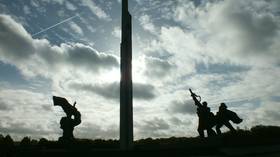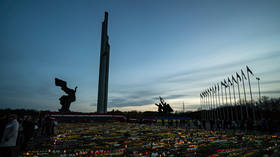Baltic state destroyed WWII monument despite UN warning

The UN Human Rights Office (OHCHR) attempted to stop the destruction of a Soviet monument commemorating the liberation of Latvia and its capital, Riga, from the Nazis in World War Two. However, the memorial was still destroyed last week as Riga claims the UN failed to inform it about its decision to introduce temporary protection measures.
The OHCHR asked Latvia to stop the dismantling of the monument – a process that was already in full swing – last week and preserve the already demolished parts, Latvian officials have confirmed to local media. An OHCHR official, Vivian Kwok, told the Sputnik news agency that the UN body had registered a complaint about the planned demolition and sought a temporary reprieve for the memorial.
This decision was made after the OHCHR had received a complaint from five people alleging a violation of the UN’s International Covenant on Civil and Political Rights by the Latvian authorities. Latvia’s Foreign Ministry claimed, however, to have received the UN body’s decision only on August 26, a day after the last remaining part of the monument – a giant 79-meter-high obelisk – had already been destroyed.
The fact that it arrived so late made the UN body’s decision unenforceable, the ministry maintained. Riga also stated that the OHCHR is “not a court” and its opinions are “not legally binding,” even though a nation recognizing the OHCHR authority should take its opinions into account and rectify shortcomings “in good faith.”
The OHCHR itself told the news agency RIA that it had not made a final decision on the complaint yet.
The demolition of the 1985 monument dedicated to the ‘Liberators of Soviet Latvia and Riga from the German Fascist Invaders’ led to protests in the Latvian capital last week. Local police detained 14 protesters last Tuesday for disobeying orders to disperse.
After Latvia gained independence following the dissolution of the USSR, the country’s authorities increasingly began seeing the memorial as a symbol of Soviet oppression and the question of taking it down was repeatedly raised. In May, the Baltic state’s government voted to remove all Soviet-era monuments by a November 15 deadline, citing the ongoing conflict in Ukraine.
Moscow has offered visas to those who were attempting to defend the monument. Meanwhile, Latvian President Egils Levits has said that people of Russian heritage whose loyalty to the government could raise questions should be “isolated from society.” Ethnic Russians comprise around 25% of the Baltic country’s population.













